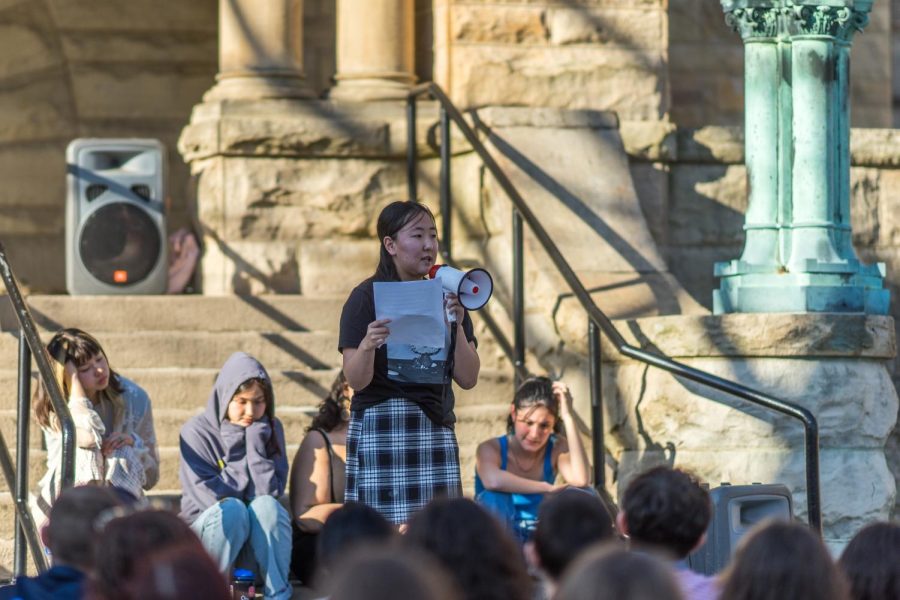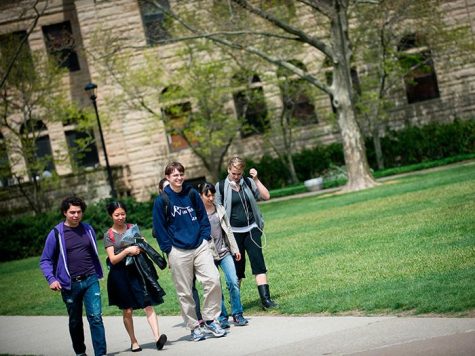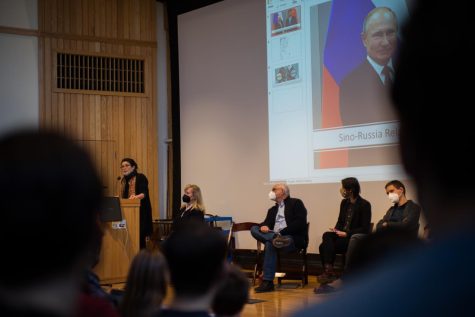Asian Diaspora Coalition Hosts Vigil to Commemorate Atlanta Spa Shootings
The Asian Diaspora Coalition held a vigil on Wednesday in honor of the victims of the 2021 Atlanta spa shootings, as well as for all people who have been subjected to sexualized anti-Asian discrimination. Co-sponsored by the Filipino American Students Association, the Multicultural Resource Center, Survivors of Sexual Harm and Allies, and the Sexual Information Center, the vigil marked the one-year anniversary of the shootings, which took the lives of eight people, six of whom were Asian women. The vigil addressed sexual violence against Asian women amid an exponential rise in anti-Asian hate crimes since the onset of the COVID-19 pandemic.
The vigil was organized by College third-years and ADC co-chairs Maya Yin Fahrer and Haley Sablay and took place on the porch of Wilder Hall. Several speakers addressed the crowd from the top steps of Wilder, expressing their personal experiences and reactions to the shootings. A crowd of students gathered in solidarity and in grief, sitting on the ground below the steps as the speakers spoke intimately of their life experiences as Asian Americans and Pacific Islanders.
Following the event, students paid their respects before an altar adorned with oranges, flowers, and incense. Many wrote statements of solidarity and support on the sidewalk. As the stories and experiences elicited grief and memories of similar traumas, members of the congregation followed the main speaking event with a more intimate debrief conversation in a room in Wilder.
“It’s 70 degrees out, [and] I think that was like a gift from the Earth saying like, ‘You know, everybody’s sitting out in Wilder, and we’re about to say a bunch of really intense s**t to them,’” Yin Fahrer said. “Maybe it’ll ruin their beautiful sunny day, but it’s ruined so many beautiful sunny days for all of us. And so I think I want them to sit in their discomfort knowing that they’re potentially — and honestly, I would say, are — perpetuating stereotypes that directly cause anti-Asian sexualized violence.”
Yin Fahrer expressed that these hateful stereotypes are predicated on the erasure of the Asian experience and representation, especially at Oberlin.
“You get this feeling that either I’m a body or I’m a caricature,” Yin Fahrer said. “And I think that’s where it comes in most at Oberlin. I want people to realize that they are not as woke as they think they are. … I want people to hear what we say and realize that they have no idea that we were dealing with this, reckon with that, and realize that they’ve had no Asian-American or Asian global history education about U.S. imperialism, and know how that affects how they see us.”
College fourth-year Lea Watkins-Chow felt empowered by the community surrounding her at the vigil, highlighting the intimacy, care, and support she received amid the debrief conversation following the emotionally-taxing event. According to Watkins-Chow, the vigil was rooted in Oberlin’s long history of multicultural solidarity and activism.
“I felt incredibly grateful to be in community with so many vulnerable, courageous people (specifically Asian women and queer Asians),” Watkins-Chow wrote in a message to the Review. “I also felt like we held space for so many people we don’t know or can’t name: all of the radical Asian Americans who have come before us at Oberlin. In particular, (my understanding is that) in the late ’70s and early ’80s, Asian Americans on campus knew the radical political nature of the identity of Asian American. They organized alongside Black and Brown students and created spaces like [Afrikan Heritage House], Third World House, Third World Co-op, and orgs like Asian American Alliance. Sitting in that room felt like a continuation of the history of activism, resistance, and care by Asian Americans on Oberlin’s campus.”










